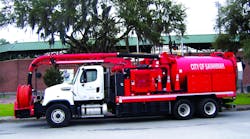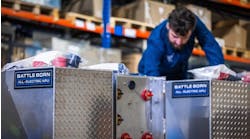Savannah, Georgia’s oldest and fifth largest city, was established in 1733 as a British colonial capital and later the first state capital. The city features a strategic port and is well known for its park-like squares that make it one of the largest National Historic Landmark Districts in the U.S. Behind the scenes, the city’s approximately 130,000 residents are served by a fleet operation of over 1,400 vehicles and pieces of equipment used by a range of departments.
The Vehicle Maintenance Dept. in Savannah, headed up by Director Iris Ellsberry-Smith, manages and maintains the city fleet for user departments. Services include preventive maintenance, repair and warranty work, and tire repair and replacement at two locations. The department’s 39 employees, serving in a variety of positions, also handle road service and fueling needs; new vehicle specification; acquisition and preparation; disposal of used equipment; and ensure compliance with local, state and federal regulations.
A common goal for city departments operating fleet vehicles is to continually improve operational productivity. One particular requirement was met through a search for a new GPS-based system that was able to do more than typical mapping of vehicle location and speed.
“We wanted advanced capabilities that would let us add data—for instance, our own department’s maps—to the system,” says William Hodgins, P.E., environmental administrator in the city’s Stormwater Management department. “We held a competitive bidding process with a dozen vendors and selected Zonar because its Ground Traffic Control solution was already collecting specialized data, and it has the ability to meet our unique mapping requirements.”
Stormwater Management is responsible for the operation and maintenance of the stormwater drainage systems throughout the city. This includes stormwater pump stations, storm sewers, drainage ditches and canals, and more than 18,000 catch basins. The department operates about 40 vehicles, including 20 dump trucks, three vacuum trucks, large and small crew units, and a number of tractors and mowers.
Today, Zonar’s electronic fleet management system, including HD-GPS and Ground Traffic Control, is in use by the Stormwater Management operation. “We supplied
Zonar with geographical maps showing the location of our manholes, curb inlets, drainage ditches, and below-ground sewer pipes,” Hodgins relates. “Zonar loaded this data into its Ground Traffic Control solution and enabled it to be displayed on GPS maps so we can see details in real-time.
“Another thing we’ve found very helpful with the Zonar system is the ability to monitor PTO operation on mowing equipment, and our vacuum truck units that are used to clean catch basins and pressure wash storm sewers,” Hodgins adds. “The electronic data trail is a double-check of paper records and operator log sheets and includes a complete timeline that we can use to measure and improve productivity.”
The Zonar system is also being used to track garbage truck movements. “The solution plays a major role in helping ensure that our refuse collection routes are being covered effectively and finished in a timely manner,” says Dalphine Magloire, sanitation fleet manager. “We have about 150 pieces of equipment, including 30 garbage trucks and sweepers, roll-offs, and boom units to track. We also use the system to verify a trash pickup if a resident questions whether we made a stop.”
“Only with a system that has the capabilities we are using in the Zonar solution are we able to combine our department maps with GPS maps to replace labor-intensive processes with cutting-edge technology,” Hodgins adds. “This has given us powerful new insights that we are using to improve the way that the City of Savannah departments work and serve our citizens.”



